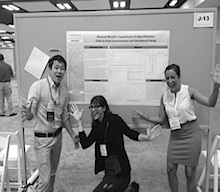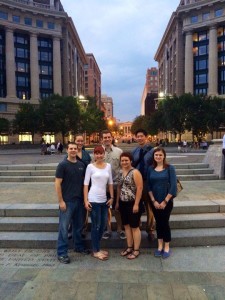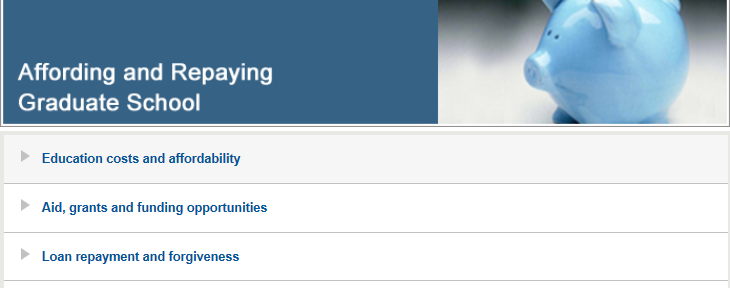 Did you know that the voting period for APAGS elections is the entire month of April? This blog post is the third in a series in which candidates answer questions posed by the current committee. Today, you’ll get a chance to hear from the two candidates for APAGS Chair-Elect: Ian Gutierrez and Michael Williams. APAGS members will be provided with voting instructions in the beginning of April and will have the chance to vote for this position, as well as Member-at-Large, Education Focus and Member-at-Large, Communications Focus.
Did you know that the voting period for APAGS elections is the entire month of April? This blog post is the third in a series in which candidates answer questions posed by the current committee. Today, you’ll get a chance to hear from the two candidates for APAGS Chair-Elect: Ian Gutierrez and Michael Williams. APAGS members will be provided with voting instructions in the beginning of April and will have the chance to vote for this position, as well as Member-at-Large, Education Focus and Member-at-Large, Communications Focus.
Chair-Elect
Question: If you weren’t studying psychology, what other career would you pursue and why?
Ian Gutierrez – Truthfully, psychology is that “other career” that I ultimately chose to pursue. My teenage dream was to become a record producer! Before graduate school, I worked as a follow-spot operator on Broadway musicals, including Spring Awakening and Gypsy, and I also worked as an audio technician on a few productions of Menopause the Musical (…honest truth, can’t make this up). While I enjoyed working in the entertainment business, I decided that I could more directly impact people’s lives for the better in another line of work. Psychology fit that bill perfectly, and I have never looked back since making that career transition. If I were not studying psychology, I would likely work in public policy. The impact that state and federal law has on public well-being, mental health, and psychological science is enormous. It is critical that mental health professionals and scientists remain engaged in the political arena.
Michael Williams – This question is challenging given that I have wanted to be a psychologist since elementary school. However, pursuit of an academic research career in neuroscience would be a strong alternate to my current career path in clinical psychology for many reasons. This field offers me the opportunity to continue engagement in research regarding brain injury and recovery. In addition, I could continue my other pursuits, including teaching, providing mentorship to undergraduate and graduate students, and engaging in community leadership. Neuroscience was my minor during undergraduate studies. I was fortunate to get undergraduate research training at Morehouse School of Medicine Neuroscience Institute in Dr. Byron Ford’s lab. This lab experience was amazing. I learned about rat models of neuroprotection and recovery for brain damage secondary to organophosphate poisoning and ischemic stroke. A career in neuroscience would nurture my passion for research of brain injury and my desire for an academic career.
Question: APAGS is doing a lot regarding the internship crisis, and plans to continue doing so. What do you think is another major issue affecting graduate students, and how do you hope to address the issue if elected as Chair? (150 word maximum)
Ian Gutierrez – The student debt crisis threatens the future of professional psychology. Educational debt in the United States exceeds one trillion dollars, creating long-term financial hardships that many of us know all too well. At the same time, graduate school is becoming increasingly expensive. Even those of us who are employed to teach or conduct research struggle to make ends meet on limited incomes. Meager incomes and heavy debts make it nearly impossible for many of us to start families, access quality healthcare, or save for the future. As APAGS Chair, I will advocate for APA program accreditation standards that account for and limit rising graduate program costs. I will also push for the establishment of APA/APAGS-supported loan assistance programs to help students pay down debts while they are still in graduate school. To learn more about my APAGS initiatives, please visit my website or email me. Thank you!
Michael Williams – Funding for graduate students in psychology is a major issue. APAGS has a done a great job examining debt load, job trends, and starting salaries. The median debt load for PsyD graduates is $120,000. It is $80,000 for PhD health service professions and $32,000 for research PhDs. Student debt has raised over time. Academia is a primary employment setting, but the full-time tenure track academic positions are declining. With the delayed entry into the workforce, debt becomes a major burden to many graduates. As Chair, I would work with APAGS to explore innovative ways to develop and identify new funding sources. I would consider ways to incentivize applying for grants and other funding mechanisms. I would collaborate with different students organizations to promote the many resources compiled by APAGS, including grants and fellowships. In addition, I hope to empower students with tools to get involved with advocacy for funding opportunities.
*****
Learn more about all candidates and be sure to vote in the upcoming APAGS election! If you are a current APAGS member with a valid email address on file, you’ll get your email ballot on April 1. If you do not receive one, please check your email spam filters and junk box. If you still do not see one, please contact Garnett Coad, the APA Director of Elections.






